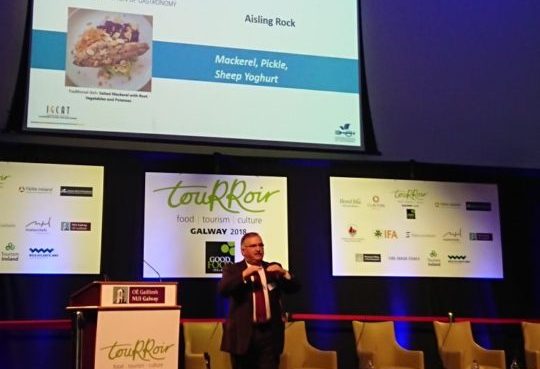On Tuesday 24 April in NUIG’s Bailey Allen Hall, the relationship between tourism, food and culture in Galway, European Region of Gastronomy 2018 was explored at TouRRoir 2018. The conference was opened by Managing Director of Good Food Ireland Margaret Jeffares who echoed the objectives and vision of IGCAT, stating that the aim of the conference was to connect the three biggest indigenous industries (food, tourism, culture); a project which is probably a bit ahead of its time.
Session Moderator Noel Toolan remarked how a sense of place is what links food, tourism and culture together and emphasised the importance of smaller countries being perceived as authentic and surprising. IGCAT Expert Fia Gulliksson spoke about Getting your Community on the Global Culinary Map and noted how working together through collaborative initiatives such as the Region of Gastronomy Award can help communities to achieve these qualities and celebrate regional distinctions and authenticity.
CEO of Galway County Council Kevin Kelly, a key public stakeholder in Galway-West of Ireland’s bid, explained that the conference was a key flagship event for this year’s European Region of Gastronomy programme stating that everyone involved was Using the opportunity of the designation to sow seeds across different industries here and across different sectors. He also highlighted the BIA Innovator Campus in Athenry, worth over €2.5 million, as an exemplar of the long-term legacy of the Award and emphasised the importance of collaboration from the locals on the ground right up to large transnational corporations.
CEO of Restaurant Australia John Hart interestingly discussed the importance of building a social license to grow tourism before large-scale growth is experienced to maintain harmony in host communities and to mould a desirable interrelationship between tourism and locals. IGCAT Expert Dr Lidia Varbanova then explained the activities of IGCAT to those in attendancea and provided many examples of successful cross-sector tourism initiatives from around the world. She discussed the potential of cross-over innovation and cultural spill-over across sectors and how these activities are the driving force behind modern sustainable tourism.
The Region of Gastronomy Award was showcased in the day’s final session entitled Ireland West: Food-Tourism-Culture Rhyming. IGCAT Founding Member Carlos Fernandes was on hand to explain the process of awarding the Region of Gastronomy designation. Session Moderator Noel Toolan questioned the panel on the Award’s impact in the Region and wondered how the initial media interest when Galway received the designation could be maintained throughout the title year. All members of the on-stage panel were keen to stress that although the media interest in the Award has remained strong throughout the year, the designation was also importantly concerned with ensuring long-term and tangible impacts on the Galway, West of Ireland Region.
Galway, West of Ireland Programme Coordinator Elaine Donohue responded by emphasising the importance of viewing Galway’s 2018 European Region of Gastronomy designation with a perspective on its long-term impact, legacy and vision for the Region. In addition to capital projects such as the BIA Innovator Campus in Athenry, IGCAT Expert and Head of Department of Culinary Arts at GMIT Jacinta Dalton strongly emphasised the importance of producer recognition and improving education to ensure a long-term legacy for the designation. She called for continued unity and collaboration among the public and private sectors in the Region, stating that a commitment to come together and realise the Region’s full potential was essential in order for Galway to fully exploit the designation.
After the conference, attendees were treated to a drinks reception and buffet dinner which showcased over 40 producers and chefs from the Galway, West of Ireland Region; the evening then concluded with an entertaining exhibition of traditional Irish dancing and music.
It was clear at the end of the conference that the future of the Region was bright, but as stated by Margaret Jeffares of Good Food Ireland, there is still a lot of work to do to fully realise and exploit the benefits of cross sector-dialogue in the three biggest indigenous sectors; food, tourism and culture. The day’s events showcased the European Region of Gastronomy Award as one example of an initiative successfully encouraging conversation, enacting change and stimulating innovation in this area.
About the European Regions of Gastronomy
The European Region of Gastronomy Platform and Award aim to contribute to better quality of life in European regions, by highlighting distinctive food cultures, educating for better health and sustainability, and stimulating gastronomic innovation. It provides cross-marketing opportunities and longer-term benefits. Being part of the European Region of Gastronomy Platform and bidding for the award brings a range of stakeholders together to confront development challenges in the region.
About IGCAT
IGCAT is a non-profit organisation established in 2012 working in the fields of gastronomy, culture, arts and tourism. Through its worldwide network of experts, IGCAT aims to empower local communities by guiding, facilitating, and supporting local leaders in cities, regions and cultural projects to understand the potential of their distinct food, culture, arts and sustainable tourism assets.
IGCAT is furthermore the official secretariat for the Region of Gastronomy Platform and provides the European Region of Gastronomy Award, the European Young Chef Award and the Innovative Food Souvenir Award.
3 mayo 2018
